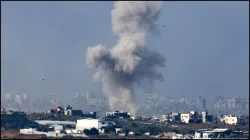Israel has indicated that it will move to a new phase of low-intensity fighting with Hamas as it announced plans to pull thousands of troops and tanks out of the Gaza Strip on Monday, even as fighting raged elsewhere accompanied by intense bombardment. An Israeli official said that the military would cut back on troop numbers and shift to a months-long phase of more localised "mopping up" operations.
Israel's nearly three-month war has reduced much of Gaza to rubble, killed more than 22,000 people and pushed the 2.3 million population into a humanitarian disaster. Israeli officials said that the war will continue for several months as it appears set on completely destroying Hamas and ending its 16-year-old rule in Gaza, while countries have called for an immediate ceasefire.
Israel has come under intense international pressure to scale back the offensive, with the United States, Israel's closest ally, has repeatedly urged the military to do more to protect Palestinian refugees. US President Joe Biden even said that Israel is losing global support due to "indiscriminate bombing" in Gaza and called on Israeli Prime Minister Benjamin Netanyahu's government to change".
What did Israel say?
The Israel Defence Forces (IDF) announced that five brigades, or several thousand troops, would be taken out of Gaza in the coming weeks. Some will return to bases for further training or rest, while many older reservists will go home. "The objectives of the war require prolonged fighting, and we are preparing accordingly," said IDF spokesperson Daniel Hagari.
A US official said that the decision appeared to indicate the start of a shift to lower-intensity operations in the north of the Palestinian enclave. This indicates a lowered offensive in Gaza as the USS Gerald R Ford aircraft carrier was announced to be returning to its home port in Virginia, after being deployed to the Eastern Mediterranean when the war broke out.
Israeli tanks have also been withdrawn from Gaza.
The Israeli official said the troop reduction would allow some reservists to return to civilian life, shoring up Israel's war-battered economy, and freeing up units in case of a wider conflict in the north with Lebanon's Iran-backed Hezbollah. Artillery fire between Hezbollah and Israel has rattled the border since the start of the Gaza conflict.
The Israeli official said that the situation on the Lebanese border "will not be allowed to continue. This coming six-month period is a critical moment". His remarks came after residents and security sources accused Israeli raids of targeting houses in the Lebanese village of Kafr Kila near the border, killing three people.
Tanks also pulled out of Gaza City's al-Mina district and parts of Tel al-Hawa district, while retaining some positions in the suburb controlling the enclave's main coastal road, residents said. They remained in other parts of northern Gaza as some people tried to return to their homes.
Hamas resistance to Israeli operations
With tanks and troops having overrun most of northern Gaza and pushing into other parts of the besieged territory, Israel said that it was close to operational control over most of the north, reducing the need for forces there. However, fighting with Hamas fighters raged in other areas, with the militant group responding with guerrilla-style ambushes from tunnels and bunkers in Gaza's narrow streets.
Israel believes that 129 of the 240 hostages captured by Hamas on October 7 are still held in Gaza after some were released during a brief truce and others killed during air strikes and rescue or escape attempts. Qatar and Egypt are seeking to negotiate a new truce and hostage deal.
Avi Dichter, a member of Israel's security cabinet, said on Kan Radio that hostages could only be freed by putting "massive" pressure on Hamas and allied groups. "Without Hamas' terrorist infrastructure being destroyed and its governance capabilities toppled, the war will not end," he said.
Meanwhile, Netanyahu stressed retaking control of Gaza's border with Egypt, an area now crammed with civilians who have fled the destruction and fighting across the rest of the enclave, which can reverse Israel's 2005 withdrawal from Gaza and flaring tensions over the leadership of a post-war Gaza. While the US supports the Palestinian Authority, Israel insists that the PA is in no condition to lead Gaza after the war.
Israel also says, without providing evidence, that more than 8,000 militants have been killed. It blames Hamas for the high civilian death toll, saying the militants embed within residential areas, including schools and hospitals.
Fighting in central parts of Gaza, however, continued unabated, according to residents there, with tanks pushing into al-Bureij and air strikes targeting al-Nusseirat, al-Maghazi and the southern city of Khan Younis. Strikes killed at least 10 people in al-Maghazi, and seven in a house in Deir Al-Balah, health officials said.
(with inputs from Reuters, AP)
ALSO READ | Israel's Supreme Court strikes down Netanyahu's controversial judicial overhaul plan
Latest World News
